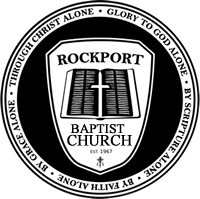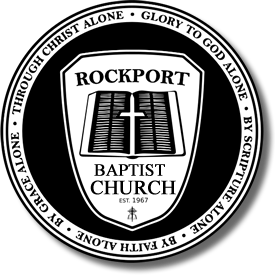One question many churches are facing during this time is the a question about the Lord’s Supper. Should it be celebrated remotely via livestream or should it not? Various answers have been given to that question (see the links below for some examples). After much prayer and study, the elders of Rockport have concluded that we will not be celebrating the Supper by livestream for the reasons given below In arriving at this decision, we are not passing judgement on those churches that do. We believe each servant must be faithful to what he understands to be his master’s will. Our study has convinced us that the very nature of the Lord’s Supper requires that we be physically present together to celebrate as Christ intended.
Why we are not celebrating the Lord’s Supper via Livestream
The longer I walk with the Lord, the more I treasure the church’s celebration of the Lord’s Supper. It has become incredibly precious to me to gather with the saints regularly to remember the death of Christ in our place through the broken bread and shared cup. So seeing it as more than just a symbolic ritual, I’ve come to value these times when we gather around His table as a genuine means of grace. Here Christ meets with us in a special way as we commune with him and one another.
For that reason, it is difficult to be without the Lord’s Supper during this time of necessary social distancing. And though there are churches that have chosen to celebrate the supper remotely via livestream, the elders of Rockport do not believe this is something we can do in good conscience. This decision has come after much discussion, study and prayer. At the end of this document, you’ll find links to articles where others have wrestled with this same issue. You can read them if you wish. But for now, let me give a summary of our thinking that has led to this decision.
• By it’s very nature, the Lord’s Supper, as given by Jesus, is meant to be a communion meal shared together by the local church as it gathers physically for worship. (1 Cor 11:20 says, “When you come together…”) And while we are grateful we can join together digitally during this time to sing and hear the word, we are not able to meet physically in the way we believe is necessary for the celebration of the Lord’s Supper. In fact, 1 Cor 11:18-22 draws a clear contrast between eating the supper separately in our various groups (which Paul says is “not the Lord’s Supper”) and eating it together as one gathered body in Christ.
• At the heart of the symbolism of the Lord’s Supper is the fact that, as we celebrate, we are not only drawn together in communion with Christ, but also with one another. 1 Cor 10:16-18 says, “ The cup of blessing that we bless, is it not a participation in the blood of Christ? The bread that we break, is it not a participation in the body of Christ? Because there is one bread, we who are many are one body, for we all partake of the one bread.” We do not partake of the cup and bread individually but together as one body sharing in the physical act of eating and drinking the symbolic body and blood of the Lord in the presence of one another.
• Another aspect of the Lord’s Supper given by Jesus is the fact that, just as in salvation, you do not provide your own food and drink, they are provided for you. I have sometimes made this point during our celebration by saying, “You didn’t bring bread and juice with you as your contribution to the supper. They were provided for you just as Christ has provided the gift of His body and blood in your place which you receive freely with gratitude.” It would miss the point of the celebration if each family came up with it’s own “communion elements.”
• Along the same lines, if we tried to celebrate online, there would be almost no way to provide everyone with the elements of communion. Some would surely be left out or be unable to come up with what is needed and so would not be able to participate, which would seem to violate the spirit of 1 Cor 11:21.
• Putting the Lord’s Supper on livestream where it is in the public domain also makes it impossible to discern who is participating and who is not. Since this is a communion meal that belongs to the church and is limited to those who profess Christ by faith alone, it is not to be served to those who are outside of Christ or in rebellion against His church (1 Cor 11:27-32). We would not serve the Lord’s Supper indiscriminately on the streets. Neither can we do so online. This is part of what it means to “discern the body” (1 Cor 11:29). Thus we believe we must limit the celebration of the Lord’s Supper to the physical gathering of the local church.
I thank God that we are able to “meet together” by livestream each Sunday to worship and hear God’s Word during this time of social isolation. But as I’ve said all along, doing so is second best at best. Livestream worship is not a true gathering of the church, nor can it substitute for the church even though it is what we are limited to at this present moment. And so for now we must fast from the supper with an ever increasing longing for that day (hopefully soon) when we will be able to be together again and thus free to celebrate His presence in communion. No one longs for that day more than your elders. And no one grieves it’s absence as much as we do, either. But we believe that, for now, it is a necessary sacrifice we make as we join others around us who are seeking to limit the spread of this pandemic. So please be patient. Continue to look to Christ by faith alone and pray for the day we can re-unite and celebrate his presence together with even greater joy.
We are so looking forward to that day of restoration
Your elders
Articles that address this issue of the Lord’s Supper during this time
• This one does a wonderful job addressing why we must “fast” from the supper for the time being, and how that helps create a deeper longing for that day when we can gather again.
• Another from The Gospel Coalition


